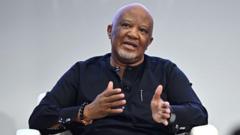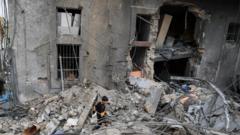"As USAID funding freezes tee up severe implications for health programs in East Africa, families face dire challenges in accessing essential HIV treatments, prompting fears of increased infections and deaths."
"The Human Toll of USAID Funding Freeze in Uganda and Malawi"

"The Human Toll of USAID Funding Freeze in Uganda and Malawi"
"The halt of USAID aid has jeopardized the lives of numerous individuals living with HIV, sparking fears of a public health crisis in Uganda and Malawi."
Life for Mike Elvis Tusubira, a 35-year-old motorcycle taxi rider living with HIV in Uganda, has drastically changed since former U.S. President Donald Trump initiated a pause on foreign aid last month. With his wife relying on PrEP, a preventive measure for HIV, Tusubira fears for both their well-being and the future of their marriage. The couple is unable to stock up on essential medications due to the aid freeze, meaning they now have to rely on condoms alone, which they view as risky.
Tusubira’s challenges represent a broader crisis in Uganda, where about 70% of HIV initiatives are funded by external donors like USAID. The agency has historically been a vital health partner in the country, providing approximately $295 million in health funding in 2023. But since Trump’s 90-day aid freeze took effect, many healthcare programs have shuttered, leaving individuals like Tusubira without resources to manage their health.
In Uganda, the shutdown has affected numerous healthcare providers. For example, Dr. Shamirah Nakitto of Reach Out Mbuya—the clinic where she worked—now finds her services halted, affecting the 200 patients she served daily. The Ugandan health ministry is scrambling to find alternative solutions but acknowledges the vast disruption caused by the aid freeze.
The ramifications extend beyond Uganda into Malawi, which also relied on U.S. support, receiving $154 million for health in 2023. With facilities like the Macro Mzuzu Clinic now closed, patients who depend on antiretroviral therapy (ART) have been left in limbo. Eddah Simfukwe Banda, a subsistence farmer in Malawi, fears for her own health and that of her family as their supplies dwindle.
Health experts warn that the effects of the aid cessation could reverse years of progress. According to UNAIDS, the halt in support could lead to an additional 6.3 million AIDS-related deaths over the next five years. The crisis has drawn attention to the high dependency on foreign aid in both countries and has prompted calls for greater self-sufficiency, although such shifts are complicated by existing economic pressures.
Current conditions leave many in fear for their lives. As Tusubira considers returning to his village where treatment access is nonexistent, he voices grim reflections, saying, "If I die, they just bury me there… I have no way I can live here without ARV services." Without immediate intervention, health organizations and experts warn of a looming public health crisis that could endanger millions across the region.




















